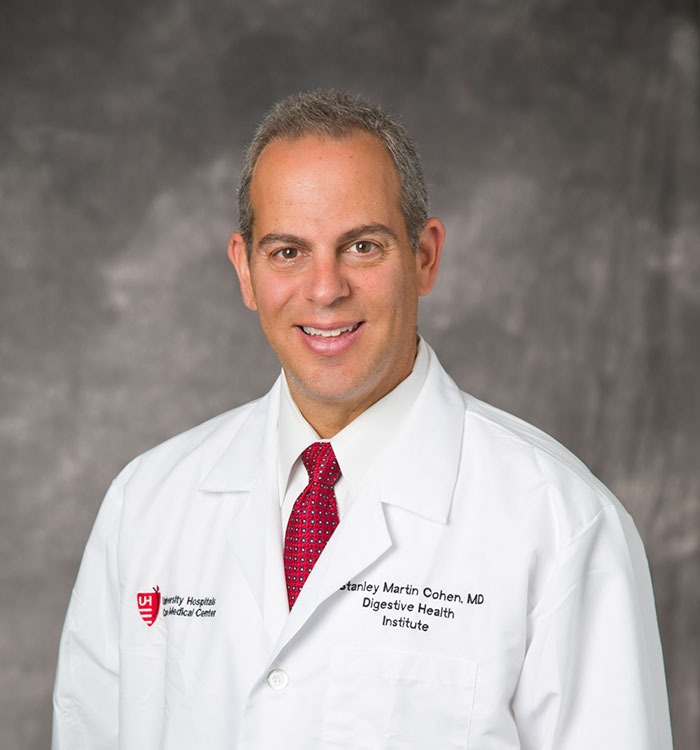Professor and Liver Specialist Dr Stanley Cohen Takes Simple Approach to Hepatitis Education
May 31, 2018
UH Digestive Health Institute - Summer 2018
 Stanley Martin Cohen, MD
Stanley Martin Cohen, MDStanley Martin Cohen, MD, FAASLD, FACG, Medical Director of Hepatology, UH Cleveland Medical Center and Professor of Medicine, Case Western Reserve University School of Medicine,has earned awards and accolades for his innovative teaching style. He doesn't use high-tech tools or a newfangled approach. Instead, he follows the lead of his original mentors at University of Southern California School of Medicine.
“I really go back to bedside, patient-focused teaching,” Dr. Cohen says. “Rather than sit in a classroom and lecture, I would rather take students, residents and fellows into the patient’s room and do physical exam findings. I ask them questions not just about a disease, but about a disease in a particular patient. That way, they're more likely to understand the information, more likely to remember it and more likely to take an interest in it, as well.”
Dr. Cohen and three other liver specialists treat patients with fellows, residents, interns and students in tow. While doctors tend to patients' needs, students observe, learn and question. Rather than give them an answer, Dr. Cohen prompts students to research a solution.
SIMPLY SPEAKING
Outside the classroom, Dr. Cohen has helped educate thousands of medical professionals through his work as Medical Director for Simply Speaking Hepatitis, now one of the largest CME-based hepatitis education programs in the United States.
The medical director of a similar program, Simply Speaking HIV, approached Dr. Cohen to develop and direct a hepatitis program. Considering his passion for both education and liver disease awareness, Dr. Cohen readily agreed.
Launched in 2006, Simply Speaking Hepatitis gives MDs, RNs, PAs and other professionals an opportunity to earn continuing education hours as well as delve deeper into Hepatitis B, C and nonalcoholic steatohepatitis topics.
“Often, education is lacking, especially when you're out in your career,” Dr. Cohen says. “We take a nonbiased, purely fact-based approach. Over the years, we've assembled one of the best speaking faculties in the world. We have nearly 100 of the country's top thought leaders on liver disease and hepatitis. These are the people who wrote the guidelines and articles and conducted the research. The credibility with this group is amazing.”
Hepatitis C remains the leading cause of liver cancer, cirrhosis of the liver and liver transplant. The World Health Organization’s Global Hepatitis Report estimates that 71 million people worldwide are living with chronic Hepatitis C.
Through Simply Speaking Hepatitis and other programs, Dr. Cohen hopes to raise awareness of today's treatments and cure rate.
“If I asked a primary care doctor the cure rate for Hepatitis C, they may say 5 percent, or 20 percent,” he says. “They're not aware that it's now 98 percent with only pills. There's a knowledge gap that we need to exploit, and then we need to get these people treated.”
THE LIVER DEBATES
In addition to CME courses, a healthy debate can inspire further education and research. In 2014, Dr. Cohen and his colleagues on the American Association for the Study of Liver Diseases (AASLD) Training and Workforce Committee brainstormed new ideas for educating members.
Dr. Cohen proposed a new program similar to the American Liver Foundation's annual fellows debate. His colleagues supported the idea, and AASLD held its first Academic Debates in 2015 at The Liver Meeting®, its annual event focused on the latest research and developments in the field.
The debates were wildly successful. “Within the next year or two, we had to take a waiting list because so many groups wanted to get involved,” he says.
During the debates, teams comprised of two fellows and one faculty mentor go head to head on hepatology topics while an expert panel moderates. “They review and debate the world's literature,” Dr. Cohen explains.
“It's exciting to see someone come out of their shell,” he notes. “There's this quiet person, and suddenly they're up and they're arguing. It's impressive. I hope that this is an event that stimulates people to get involved in academics or pursue it as a career.”
Through his work at UH, Dr. Cohen aims to inspire even more men and women to pursue a career researching, teaching and/or treating liver disease.
“I'd like to take innovative, personalized teaching approaches – which may actually be old school – and really challenge the next generation of thought leaders,” he says.
To refer a patient with a liver condition, please call 216-286-6757.


